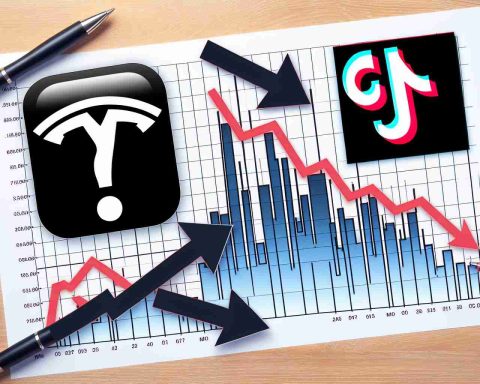Revolutionizing EV Charging in the Cherokee Nation
A substantial federal initiative is set to transform the electric vehicle (EV) landscape within the Cherokee Nation. As part of President Biden’s commitment to expand EV charging infrastructure nationwide, this initiative aligns with the Justice 40 initiative aimed at investing in disadvantaged communities.
The recent funding will facilitate the installation of 112 new electric vehicle chargers at 12 strategically chosen locations across the Cherokee Nation reservation. Planned sites for these chargers include Ochelata, Jay, South Coffeyville, Nowata, Tahlequah, Stilwell, Grove, Salina, Vinita, and Tulsa. This expansion will complement the existing network of charging stations already established by the tribe, creating a comprehensive system where residents can find charging stations within a 25-mile radius.
Cherokee Nation’s Principal Chief, Chuck Hoskin Jr., emphasized the tribe’s commitment to environmental sustainability, outlining a target of reducing the carbon footprint by 25 percent by 2027. The funding from the U.S. Department of Transportation is a critical step towards achieving this ambitious goal.
Notably, the Cherokee Nation is the only recipient of this funding in Oklahoma and has plans to partner with Tulsa-based Francis Energy to oversee the implementation of this essential project. This initiative not only supports the growing number of electric vehicles but also underscores a dedicated effort to promote cleaner energy solutions within the community.
Transforming Transportation: The Impact of EV Charging Expansion in the Cherokee Nation
The recent initiative to install 112 electric vehicle (EV) chargers within the Cherokee Nation represents a significant stride towards a more sustainable future. This project is part of a broader federal effort spearheaded by President Biden’s administration, focusing on expanding EV charging infrastructure across the United States, particularly in underserved and disadvantaged communities. The effects of this initiative extend far beyond the immediate benefits of improved accessibility for EV users; they resonate profoundly with environmental sustainability, economic development, and the overall well-being of humanity.
Supporting the use of electric vehicles is essential in the fight against climate change. By providing the necessary infrastructure for EVs, the Cherokee Nation takes a critical step towards reducing reliance on fossil fuels. The initiative aligns with the tribe’s goal of decreasing its carbon footprint by 25% by 2027. This commitment not only aims for a cleaner environment within the Nation but also contributes positively to global efforts to mitigate carbon emissions. Transitioning to EVs can lead to reduced air pollution and lower greenhouse gas emissions, which are vital in curbing the adverse effects of climate change on both local and global scales.
Economically, the establishment of a comprehensive charging network supports the burgeoning EV market, which presents a plethora of opportunities for job creation and local investment. The partnership with Tulsa-based Francis Energy aims to leverage local expertise and resources, ensuring that this initiative fuels regional economic growth. The installation of these charging stations can attract more electric vehicle owners to the area, stimulate tourism, and boost local businesses, thereby creating a vibrant economic ecosystem around sustainable practices.
Furthermore, accessibility to EV chargers within a 25-mile radius enhances the quality of life for residents. As EV adoption grows, the infrastructure ensures that residents can confidently transition to electric vehicles without the fear of limited charging facilities. This shift promotes energy independence and reduces the economic strain caused by fluctuating gasoline prices, creating long-term benefits for household budgets.
On a broader scale, the project embodies a commitment to inclusivity and social justice. By focusing on disadvantaged communities through initiatives like Justice 40, the federal government seeks to address historical inequities in access to clean transportation options. This aspect not only uplifts the Cherokee Nation but sets a precedent for similar initiatives across the country, showing that the path toward sustainable transportation must be equitable and accessible for all.
Looking ahead, the expansion of EV charging infrastructure in the Cherokee Nation serves as a model for future developments. As the world grapples with environmental challenges and strives for a sustainable future, projects like this highlight the pivotal role of indigenous communities in leading the way toward innovative solutions. The interconnectedness of environmental sustainability, economic prosperity, and social equity is more evident than ever, and the Cherokee Nation’s steps to enhance EV access demonstrate a proactive approach to ensuring a healthy planet for future generations.
In conclusion, the installation of EV chargers in the Cherokee Nation is more than just an infrastructure upgrade; it is a transformative move towards a sustainable future. By integrating environmental considerations into economic and social frameworks, this initiative not only benefits the Cherokee people but also serves as a beacon of hope and a blueprint for humanity’s collective aspirations for a greener, more just world.
Revolutionizing EV Charging: Cherokee Nation Leads the Charge Towards Sustainability
Overview of the Initiative
The Cherokee Nation is set to play a pivotal role in the electric vehicle (EV) revolution, thanks to a significant federal initiative aimed at enhancing EV charging infrastructure. This program, part of President Biden’s broader strategy to increase sustainable transportation options across the United States, reflects the goals of the Justice 40 initiative which seeks to direct investments into underserved communities.
Key Features of the Charging Network
The forthcoming project will result in the installation of 112 new electric vehicle chargers at 12 strategically selected locations throughout the Cherokee Nation. These locations include Ochelata, Jay, South Coffeyville, Nowata, Tahlequah, Stilwell, Grove, Salina, Vinita, and expand into Tulsa. Such strategic placement is set to ensure that residents and visitors can access charging stations within a 25-mile radius, enhancing the practicality of owning an electric vehicle in the region.
Environmental Sustainability Goals
Principal Chief of the Cherokee Nation, Chuck Hoskin Jr., has articulated a vision focused on environmental sustainability, with an ambitious aim of reducing the tribe’s carbon footprint by 25 percent by 2027. This initiative signifies a major commitment to not only advancing transportation infrastructure but also making meaningful strides in combating climate change.
Partnerships and Community Impact
The Cherokee Nation has partnered with Francis Energy, a Tulsa-based firm specializing in energy solutions, to execute this project. This collaboration is expected to expedite the rollout of the charging stations while ensuring that they are integrated seamlessly into the community’s existing infrastructure. The initiative represents a dual benefit: supporting the increasing adoption of electric vehicles while promoting cleaner energy practices.
Limitations and Considerations
While this initiative marks significant progress in EV infrastructure, it’s important to recognize some limitations. The success of this program will largely depend on:
– Public adoption: Encouraging more residents to transition to electric vehicles.
– Technology compatibility: Ensuring that the charging stations are compatible with a variety of electric vehicle models.
– Operational efficiency: Keeping the chargers well-maintained and operational to meet the demand.
Trends and Future Innovations
The development in the Cherokee Nation reflects a broader trend of increasing investments in EV infrastructure across the U.S. As electric vehicle sales continue to rise, cities and communities are seeking sustainable and innovative solutions to accommodate this shift.
Insights into the Electric Vehicle Market
According to a recent report by the International Energy Agency (IEA), global electric car sales are expected to triple by 2025, highlighting the increasing necessity for extensive charging networks. As cities adopt more advanced EV infrastructure, regions like the Cherokee Nation will be at the forefront, paving the way for others to follow suit.
Conclusion
The Cherokee Nation’s initiative to expand its EV charging infrastructure provides a roadmap for sustainable transportation in underserved areas. By investing in electric vehicle chargers and committing to reducing their carbon footprint, the Cherokee Nation is not only enhancing local mobility but also contributing to a healthier planet.
For more information about ongoing environmental initiatives, visit the Cherokee Nation official website.


















